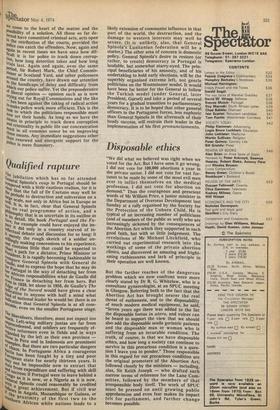Qualified rapture
e jubila tion which has so far attended teeneral Spinola's coup in Portugal should be eiltiPered with a little cautious realism, for it is the that the fall of Dr Caetano may well be la Prelude to destruction and subversion on a rg„e scale, not only in Africa but in Europe as It is, in fact, clear that General Spinola philsono real programme of action, and a sophy that is as uncertain in its outline as ri,!ts detail. His book Portugal and the Fure, for example could have enjoyed the im Pact . to, IL did only in a country starved of in teetual debate and discussion for so long: it the rough sketch of a soldier unaortinglY making concessions to his experience, e6' contains little that could be expected to PrZ,r,t a path for a dictator, Prime Minister or ee'glent. It is rapidly becoming fashionable to Gatil„Pare General Spinola with General de e, and to express the hope that he may do he'reortugal in the way of detaching her from for A,frican responsibilities what de Gaulle did eve'rance in detaching her from hers. But kcin in 1939, let alone in 1958, de Gaulle's The gie of the Sword would have given a clear kihd'eation to anyone with half a mind what °f national leader he would be: there is no Darf,a,tion that General Spinola is at all corn e, even on the smaller Portuguese stage. The fhtpliheralisers, therefore, must not expect too Left-wing military juntas are far from feQ"tr.ecedented, and soldiers are frequently efter, Ive reformers even in fields and in ways th°04,rtled by the left as their own province — tka-h,e in Peru and in Indonesia are prominent Of ,;",Ples. But there are two particular dangers hat`toale OS. In Portuguese Africa a courageous Eur, has been fought by a tiny and poor loa;Pean state for nearly thirteen years. It stat "t be impossible now to extract that trom expenditure and suffering with skill CohsUccess: if Portugal were to leave behind a qen"go as it is now, or a Nigeria as it is now, Whi!ral Spinola could reasonably be credited foe a great achievement. But if civil war if t(),,sys in Angola, Mozambique or Guinea, or sou:le proximity of the first two to the k'he'll African white nations leads to a likely extension of communist influence in that part of the world, the destruction, and the damage to western interests may well be severe. (It is unlikely, alas, that General Spinola's Lusitanian federation will be a starter.) The other area of concern is domestic policy. General Spinola's desire to restore (or rather, to create) democracy in Portugal is laudable, but somewhat starry-eyed. The principal beneficiaries of his amnesty, and of his undertaking to hold early elections, will be the superbly organised extreme left, not gentle politicians on the Westminster model. It would have been far better for the General to follow the Turkish model (under General, later President, Gursel) and take a period of several years for a gradual transition to parliamentary democracy. It is to be hoped that other general officers in the Portuguese forces, less euphoric than General Spinola in the aftermath of their heady success, will restrain their leader in the implementation of his first pronunciamento.


































 Previous page
Previous page